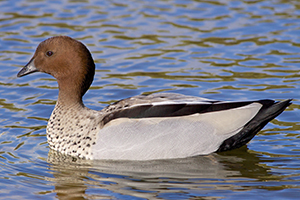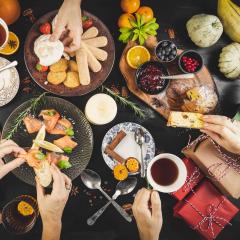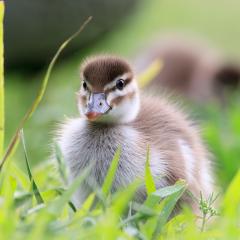 UQ is a haven for our feathered friends, with numerous native species and over 100 bird boxes across all sites and campuses. But how well do you know your birds? In the third of our Campus Bird Life series, we'll be introducing you to the water-loving Australian wood duck.
UQ is a haven for our feathered friends, with numerous native species and over 100 bird boxes across all sites and campuses. But how well do you know your birds? In the third of our Campus Bird Life series, we'll be introducing you to the water-loving Australian wood duck.
What bird is that?
The Australian wood duck (Chenonetta jubata) is a dabbling duck that’s found across Australia. It’s also known as the maned duck or maned goose because the male of the species has a small black crest on the back of its head; the ducks also have notably goose-like features, including a short bill. Males have dark brown heads and necks and black lower bellies and undertails, while females have white lines above and below their eyes and a white lower belly and undertail.
These adaptable creatures prefer shallow water, and are fond of grasslands, wetlands, open woodlands, farm dams and flooded pastures. Their natural diet consists of grasses, herbs, clover and insects, and they nest in tree hollows above or near water during breeding season. When wood duck babies are born, they drop from their nests down to the ground, where their parents are waiting to guide them to safety.
Friend or foe?
Australian wood ducks aren’t a threatened species, and they’ve actually benefited from agricultural development such as dams and irrigated crops. They’re often found in urban areas near water, including parks and golf courses, and are excellent at adapting to modified environments. While they may not like you getting too close to them if they’re with their babies, they won’t mind if you admire them from afar.
Wood duck management on campus
Although the wood duck can be a pest in some areas because it damages crops, our campus ducks are happy keeping to themselves and foraging in shallow water — unlike some other campus birds we could name, these guys aren’t going to try stealing your lunch. But as with all bird species on campus, we’d recommend not feeding human food to Australian wood ducks and disrupting their natural diet.



